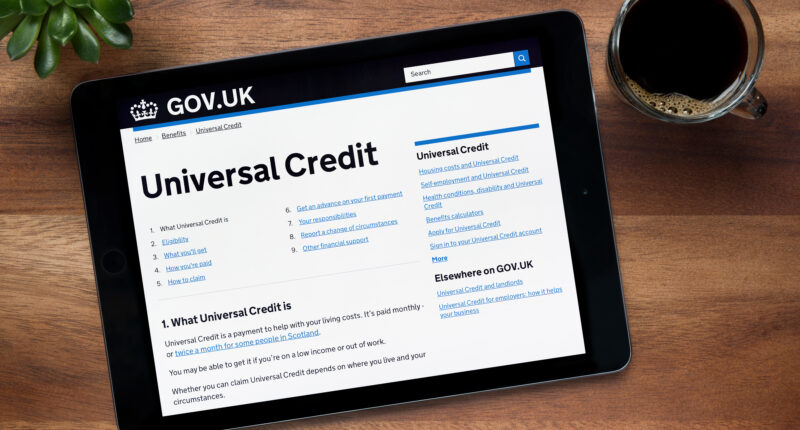PEOPLE are only just realising that a big change to benefits and Universal Credit is “delayed”.
It comes after millions of households on mean-tested benefits expected to receive an inflation-linked payments boost in April.
But some households on Universal Credit will not get the new rates until June, according to experts at Turn2Us.
Universal Credit payments increased in line with September’s 10.1% inflation figure on April 10.
For example, for those single and aged under 25, the standard allowance grew from £265.31 to £292.11.
Howevever, many have complained on social media to explain that their payment rates haven’t changed.


One person said on Twitter: “Just had my Universal Credit statement for May and although promised by the government that it will increase in line with inflation there is no increase this month? Why?”
“I’ve just received my Universal Credit statement and it’s not showing any increase, I thought it was going up 10.1% any ideas,” said another.
A third said: “I didn’t get an increase in my Universal Credit today.”
However, the reason these claimants haven’t received the pay boost yet is entirely dependent on when their last assessment period was.
Most read in Money
Universal Credit is paid monthly and is based on your circumstances each month.
This is called your “assessment period” and it starts the day you make your claim.
Anna Stevenson, benefits expert at Turn2us said: “For Universal Credit, the new rates don’t come into effect until the first assessment period which starts on or after April 10.
“That means the earliest people will see the new rates is in payments from May 17.
“But for some people, it could take until June 16 to get their first payment on the new amounts.”
For example, if a claimant’s assessment period started on March 26, it would run until April 25, with a new assessment period beginning on April 26.
As Universal Credit is paid a week after the date of each assessment period meaning that the claimants would receive their payment on May 2.
However, because the claimant’s March to April assessment period started before April 10, the new rates will not take effect until the after next assessment period between April 26 and May 25 for payment on June 1.
If a claimant assessment period started after the new Universal Credit rates came into force on April 10 they can expect to receive the new rates this month.
For example, if a claimant’s assessment period ran between April 12 and May 11, they would receive the new payment rates from May 18.
The increase in payments will automatically be applied by the Department for Work and Pensions (DWP).
It’s always worth checking to see if you’re getting all the benefits you’re entitled to by using a free benefits checker.
How have Universal Credit payments increased?
Universal Credit is paid to millions of people to help with everyday living costs.
It is paid monthly, or twice a month for some in Scotland.
Under the system, you receive different amounts depending on your circumstances.
Below is what the previous rates (2022/23) are and what they went up to from April 10, depending on your circumstances.
Standard allowance (per month)
- For those single and aged under 25, the standard allowance will rise from £265.31 to £292.11
- For those single and aged 25 or over, the standard allowance will rise from £334.91 to £368.74
- For joint claimants both under 25, the standard allowance will rise from £416.45 to £458.51
- For joint claimants where one or both are 25 or over, the standard allowance will rise from £525.72 to £578.82
Extra amounts for children
- For those with a first child born before April 6, 2017, the extra amount is going up from £290 to £315
- For those with a child born on or after April 6, 2017 or second child and subsequent child, the extra amount is going up from £244.58 to £269.58
- For those with a disabled child, the lower rate addition payment is going up from £132.89 to £146.31 and the higher rate from £414.88 to £456.89
Extra amounts for limited capability for work
- For those deemed to have limited capability for work, the extra amount is going up from £132.89 to £146.31
- For those deemed to have limited capability for work or work-related activity, the extra amount is going up from £354.28 to £390.06
Extra amounts for being a carer
Universal Credit claimants can get an additional amount if they’re caring for a severely disabled person for at least 35 hours a week.
The amount you get a month will rise from £168.81 to £185.86.
Increased work allowance
- The higher work allowance (no housing amount) for someone claiming Universal Credit with one or more dependent children or limited capability for work is going up from £573 to £631
- The lower work allowance for someone claiming Universal Credit with one or more dependent children or limited capability for work is going up from £344 to £379
What about other benefits?
Millions of households on other means-tested benefits got a payment boost on April 10.
The government hiked the rates of a number of benefits by 10.1% to try and keep up with inflation.
We’ve listed all the benefits that received a pay boost last month – but you can use the tool below to find out how your payments have changed.










